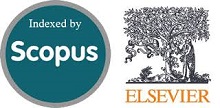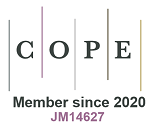Understanding Food Delivery Mobile Application Technology Adoption: A UTAUT Model Integrating Perceived Fear of COVID-19
Downloads
Doi: 10.28991/esj-2021-SPER-08
Full Text: PDF
Downloads
Kasikorn Research Center. "Food delivery businesses set to expand due to intensifying competition post-COVID-19; while big operators set sight on shaping their platforms into Super Applications.” August 5, 2020. Available online: https://www.kasikornresearch.com/en/analysis/k-econ/business/Pages/z3128-Food-Delivery.aspx (accessed on 22 December 2020).
O'Byrne Rob. "Covid-19 pandemic triggers surge in global food delivery industry.”. Available online: https://trans.info/en/covid-19-pandemic-triggers-surge-in-global-food-delivery-industry-178243 (accessed on 22 December 2020).
Bangkok Post. "The food delivery challenge.”. Available online: https://www.bangkokpost.com/business/1850974/the-food-delivery-challenge (accessed on 22 December 2020).
Sumagaysay Levi. "The pandemic has more than doubled food-delivery apps' business. Now what?.” Available online: https://www.marketwatch.com/story/the-pandemic-has-more-than-doubled-americans-use-of-food-delivery-apps-but-that-doesnt-mean-the-companies-are-making-money-11606340169 (accessed on 7 January 2021).
Coruscate. "Food Delivery App Business Future potential – pandemic has more than doubled business of food-delivery apps.” Available online: https://www.coruscatesolution.com/food-delivery-app-business-future-potential/ (accessed on 7 January 2021).
Al-Maroof, Rana Saeed, Said A. Salloum, Aboul Ella Hassanien, and Khaled Shaalan. "Fear from COVID-19 and Technology Adoption: The Impact of Google Meet During Coronavirus Pandemic.” Interactive Learning Environments (October 14, 2020): 1–16. doi:10.1080/10494820.2020.1830121.
Wnuk, Anna, Tomasz Oleksy, and Dominika Maison. "The Acceptance of Covid-19 Tracking Technologies: The Role of Perceived Threat, Lack of Control, and Ideological Beliefs.” Edited by Valerio Capraro. PLOS ONE 15, no. 9 (September 11, 2020): e0238973. doi:10.1371/journal.pone.0238973.
Venkatesh, Viswanath, Michael G. Morris, Gordon B. Davis, and Fred D. Davis. "User Acceptance of Information Technology: Toward a Unified View.” MIS Quarterly 27, no. 3 (2003): 425-478. doi:10.2307/30036540.
Rahi, Samar, Mubbsher Munawar Khan, and Mahmoud Alghizzawi. "Factors Influencing the Adoption of Telemedicine Health Services During COVID-19 Pandemic Crisis: An Integrative Research Model.” Enterprise Information Systems 15, no. 6 (December 8, 2020): 769–793. doi:10.1080/17517575.2020.1850872.
Walrave, Michel, Cato Waeterloos, and Koen Ponnet. "Ready or Not for Contact Tracing? Investigating the Adoption Intention of COVID-19 Contact-Tracing Technology Using an Extended Unified Theory of Acceptance and Use of Technology Model.” Cyberpsychology, Behavior, and Social Networking 24, no. 6 (June 1, 2021): 377–383. doi:10.1089/cyber.2020.0483.
Ezzaouia, Imane, and Jacques Bulchand-Gidumal. "A Model to Predict Users' Intentions to Adopt Contact-Tracing Apps for Prevention from COVID-19.” Information and Communication Technologies in Tourism 2021 (January 12, 2021): 543–548. doi:10.1007/978-3-030-65785-7_51.
Lee, Suk Won, Hye Jin Sung, and Hyeon Mo Jeon. "Determinants of Continuous Intention on Food Delivery Apps: Extending UTAUT2 with Information Quality.” Sustainability 11, no. 11 (June 4, 2019): 3141. doi:10.3390/su11113141.
Alalwan, Ali Abdallah. "Mobile Food Ordering Apps: An Empirical Study of the Factors Affecting Customer e-Satisfaction and Continued Intention to Reuse.” International Journal of Information Management 50 (February 2020): 28–44. doi:10.1016/j.ijinfomgt.2019.04.008.
Yeo, Vincent Cheow Sern, See-Kwong Goh, and Sajad Rezaei. "Consumer Experiences, Attitude and Behavioral Intention toward Online Food Delivery (OFD) Services.” Journal of Retailing and Consumer Services 35 (March 2017): 150–162. doi:10.1016/j.jretconser.2016.12.013.
CBRE Thailand. "Food Delivery Putting Traditional Stores on the Line.” February 5, 2020. Available online https://www.cbre.co.th/news/food-delivery-putting-traditional-stores-on-the-line (accessed on 22 December 2020).
Pigatto, Gessuir, Joao Guilherme de Camargo Ferraz Machado, Amanda dos Santos Negreti, and Lucas Miranda Machado. "Have You Chosen Your Request? Analysis of Online Food Delivery Companies in Brazil.” British Food Journal 119, no. 3 (March 6, 2017): 639–657. doi:10.1108/bfj-05-2016-0207.
Palau-Saumell, Ramon, Santiago Forgas-Coll, Javier Sánchez-García, and Emilio Robres. "User Acceptance of Mobile Apps for Restaurants: An Expanded and Extended UTAUT-2.” Sustainability 11, no. 4 (February 25, 2019): 1210. doi:10.3390/su11041210.
Jaradat, Mohammed-Issa Riad Mousa, and Abedalellah Mohammed Al-Mashaqba. "Understanding the adoption and usage of mobile payment services by using TAM3." International Journal of Business Information Systems 16, no. 3 (July 22, 2014): 271-296. doi:10.1504/IJBIS.2014.063768.
Chayomchai, Ampol. "The Online Technology Acceptance Model of Generation-Z People in Thailand during COVID-19 Crisis." Management & Marketing. Challenges for the Knowledge Society 15, no. s1 (October 23, 2020): 496-512. doi:10.2478/mmcks-2020-0029.
Zhao, Yuyang, and Fernando Bacao. "What factors determining customer continuingly using food delivery apps during 2019 novel coronavirus pandemic period?." International Journal of Hospitality Management 91 (October 2020): 102683. doi:10.1016/j.ijhm.2020.102683.
Gerhold, Lars. "COVID-19: Risk Perception and Coping Strategies.” PsyArXiv (March 25, 2020). doi:10.31234/osf.io/xmpk4.
Huynh, Toan Luu Duc. "Data for Understanding the Risk Perception of COVID-19 from Vietnamese Sample.” Data in Brief 30 (June 2020): 105530. doi:10.1016/j.dib.2020.105530.
Hair, Joseph F., William C. Black, Barry J. Babin, Rolp E. Anderson, and Ronald L. Tatham. "Multivariate data analysis New Jersy: Pearson Education." (2010).
Gaskin, James, and John Lim. "Multigroup Analysis-AMOS Plugin." Gaskination's StatWiki (2018). Available online: http://statwiki.kolobkreations.com/index.php?title=Main_Page (accessed on 30 November 2020).
Sangeeta, and Urvashi Tandon. "Factors Influencing Adoption of Online Teaching by School Teachers: A Study during COVID-19 Pandemic.” Journal of Public Affairs (October 14, 2020): e2503. doi:10.1002/pa.2503.
Teles, Milena, Teresa Sacchetta, and Yuri Matsumoto. "COVID-19 Pandemic Triggers Telemedicine Regulation and Intensifies Diabetes Management Technology Adoption in Brazil.” Journal of Diabetes Science and Technology 14, no. 4 (June 2, 2020): 797–798. doi:10.1177/1932296820930033.
McKinsey & Company. "How COVID-19 has pushed companies over the technology tipping point”and transformed business forever.” October 5, 2020. Available online: https://www.mckinsey.com/business-functions/strategy-and-corporate-finance/our-insights/how-covid-19-has-pushed-companies-over-the-technology-tipping-point-and-transformed-business-forever (accessed on 5 January 2021).
Shead Sam. "Covid has accelerated the adoption of online food delivery by 2 to 3 years, Deliveroo CEO says.” December 3, 2020. Available online: https://www.cnbc.com/2020/12/03/deliveroo-ceo-says-covid-has-accelerated-adoption-of-takeaway-apps.html (accessed on 5 January 2021).
- This work (including HTML and PDF Files) is licensed under a Creative Commons Attribution 4.0 International License.







